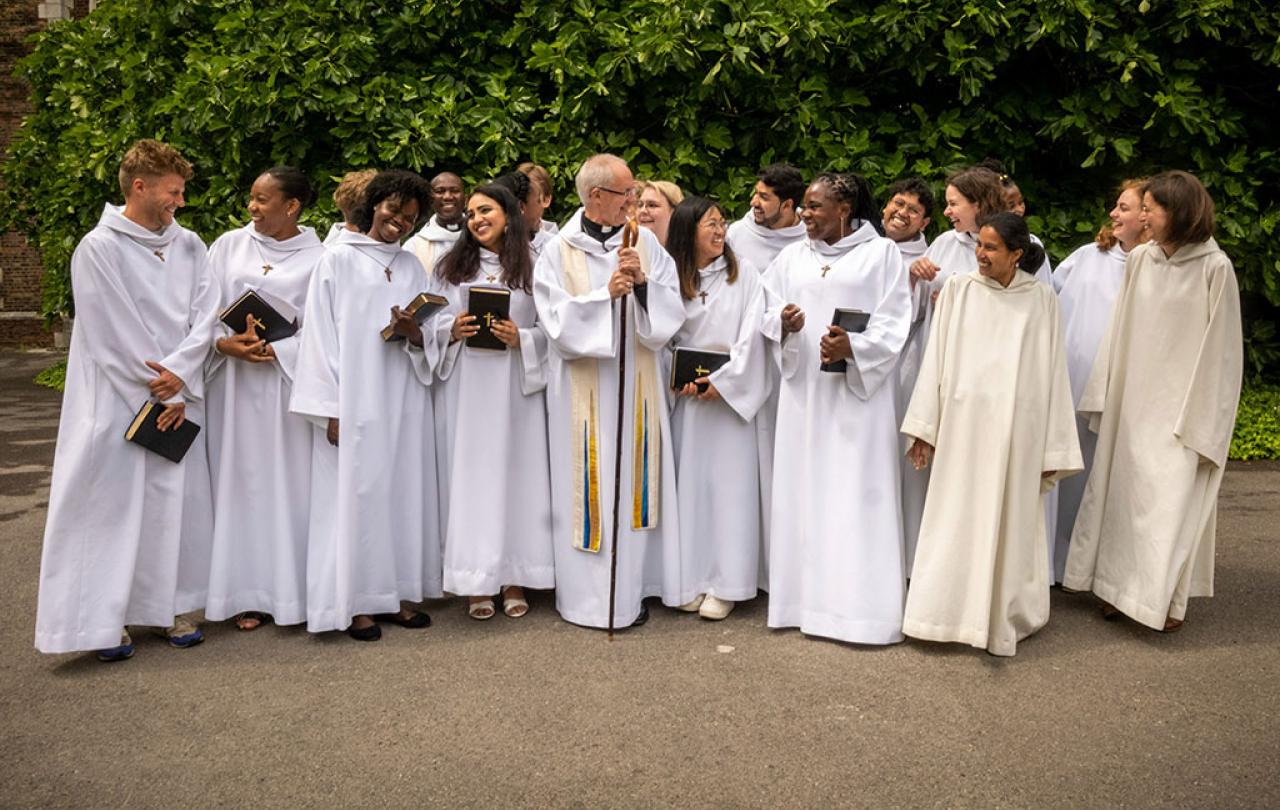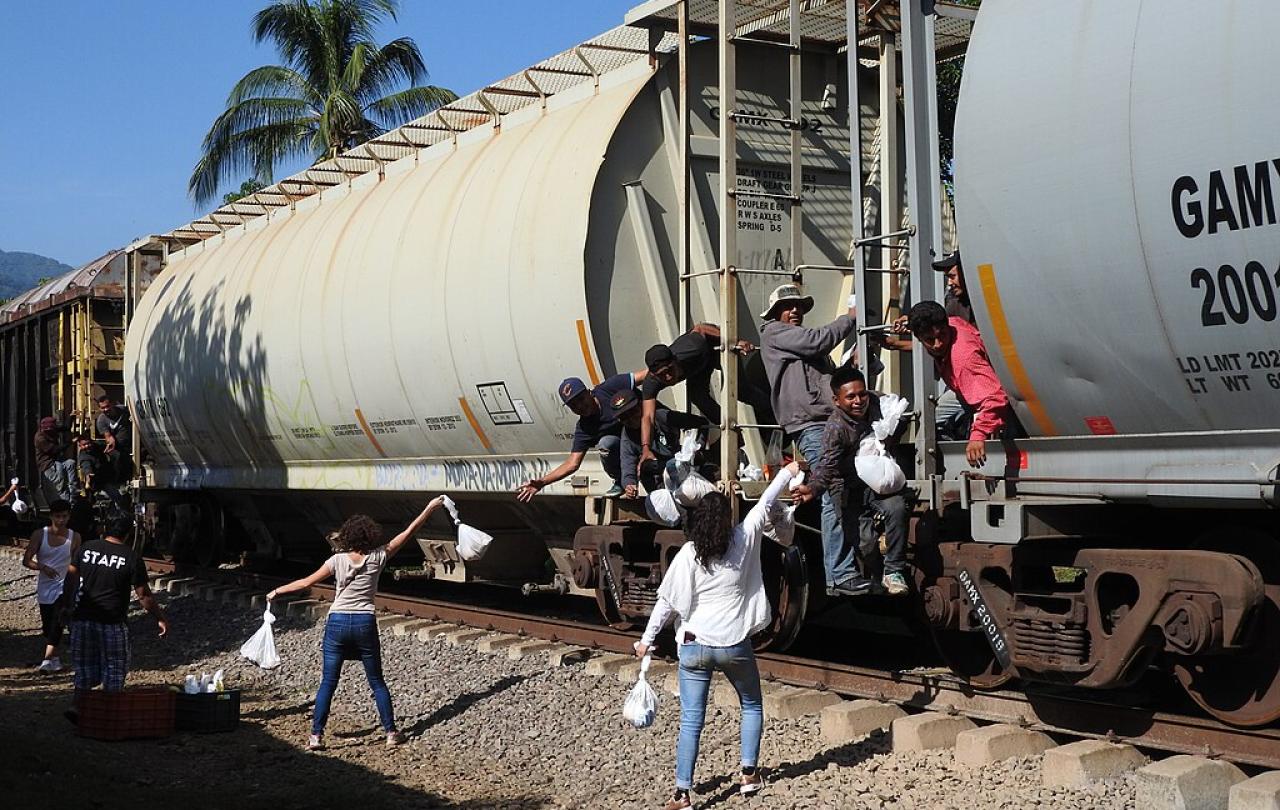
Six years ago, I stood in white, full of nervous excitement, in front of a priest to make a vow. But it was a prayer robe, not a dress, and the priest happened to be the Archbishop of Canterbury. I was not getting married but joining a religious community.
The Community of St Anselm (CoSA) was founded by Archbishop Justin Welby in 2015, and I was amongst the third cohort of young Christians, aged 20-35, committing to spending a year together. Some of my fellow community members came from across the globe, entirely stepping away from their everyday lives. They spent the year living in Lambeth Palace, devoting their time to prayer, study and service. Others, like me, remained in our homes and jobs, whilst also trying to reorientate our lives around those three worthy pastimes.
By committing to a pattern of living, giving up on the idea that I was in control and limiting my choices I found much liberation.
In my experience, much of life - and the Christian faith in particular - is counter-intuitive. It would be a logical hypothesis to suppose that restricting your life in this way – agreeing to reorientate towards living by a set of rules and to fall into a structured way of being – would be stifling. And yet, like thousands before me, I found the complete opposite to be true.
Our culture upholds choice; we are told that the ability to choose is the ultimate expression of freedom. And whilst this may be true with big choices – where to live, who to live with, what work to do - our brains don’t cope as well with a lot of day-to-day options as we might be led to believe. In a 2000 experiment, psychologists observed that a supermarket display with 24 different types of jam generated a lot of interest but not many sales. In contrast, a display with just six different types of jam meant people were nearly ten times more likely to go on to make a purchase. If, like me, you’re prone to spending inordinate amounts of time deciding what to have for dinner, I’m sure you can relate.
Monks and nuns have understood this human tendency to get overwhelmed and expend energy on small decisions - suffering from what we now call decision fatigue - for many centuries. Whilst we may find the idea of a rigid schedule and a limited menu and wardrobe austere, not having to make those decisions every day can free up mental energy for other things. It’s the same reason why some tech entrepreneurs espouse the idea of wearing the same black turtleneck or grey t-shirt every day.
Whilst my own experience of religious life was not as extreme as those who make a life-long vow, I did find that in committing to a pattern of living, giving up on the idea that I was in control and limiting my choices I found much liberation. The chatter in my mind quietened a little. I became more comfortable in my own skin. I felt more and more like my truest self.
Attempting Cal Newport’s monk mode productivity hack by turning off our digital devices for the morning - or listening to a podcast from former Hindu monk, Jay Shetty - is as close to encountering monasticism as many of us get. CoSA draws on wisdom from several saints who themselves founded religious communities: St Benedict, St Francis and St Ignatius of Loyola. Whilst trying to emulate their way of life wasn’t always easy, I seized the opportunity to go deeper and threw myself into the intensity of the year.
As a teenager I was always late to morning tutorial, despite being able to see my secondary school from my house. During my time in the community, I struggled to shake this habit and would usually be rushing to Lambeth Palace each Monday evening, arriving after those who had travelled from as far as Oxford, Poole and Canterbury, despite only working 10 minutes down the road.
Those evenings were spent eating, talking and praying together and quickly became the highlight of each week for me. A time to put aside the day-to-day stresses and just try to be present with the other members of the community. We finished each gathering by praying compline, or night prayer, in the crypt at Lambeth Palace. In Celtic Christianity there is a concept of ‘thin spaces’, places where the boundary between heaven and earth seems a little more permeable. The cool, silver-lit crypt at Lambeth is one of those places for me; it seems to crackle with sacred potential.
We also took three retreats in an Abbey during the year, near a stretch of wild Cornish coastline. Precious time away from the bustle of the city. Away from the demands of life admin and meetings and untameable inboxes. The strapline - for want of a better word – of the Community of St Anselm is “A year in God’s time”, and I think that actually sums it up pretty well. We spent a year trying to live a simpler, slower life. A life marked by prayerfulness and the sufficiency of God, rather than the bigger, better, hustle culture pressures of modern living.
We went into these new relationships acknowledging that we wouldn’t agree on everything, but actively deciding to love each other anyway.
Only the most disciplined of us can maintain healthy habits, like daily prayer and reflection, on our own. It’s easier to go to the gym with a buddy. The upcoming book club meeting nudges us to keep reading. I think that’s what drew me to join CoSA; I knew I needed mutual accountability and support to sustain the spiritual disciplines I craved in my life.
In the community’s Rule of Life – the guidelines we each agreed to follow during the year – there is a line “We choose on another” and this has had a profound effect on me. The idea that we chose to put our shared life in the community ahead of everything else for that year has shaped me deeply. I have forged some amazing friendships through the community, but before we had even met each other, or learned to like each other, we chose to love each other in all our diversity and difference.
I do find that church is one of the places I am most likely to encounter people who are different to me – particularly intergenerationally – but even in finding a place of worship, there can be a tendency to seek out one that ticks as many of one’s personal preferences as possible. In the weeks leading up to joining the community I had been unsure what to expect. Having not grown up in a Christian family, would I feel left behind? Coming from a less-wordy type of church, would I get lost in the orders of service? Would everyone think I was too socially liberal? Would I find them too conversative?
The act of choosing one another put all of that aside. In stepping out of our everyday lives, we also stepped out of our respective echo chambers. We went into these new relationships acknowledging that we wouldn’t agree on everything, but actively deciding to love each other anyway. It was hard at times, but I came to see that whilst people had come to different conclusions on issues to me, they had done so no less thoughtfully. I came to see that we had much more in common than the things which society would say should separate us.
In smaller ways too, I believe it is possible to choose to love others around us. We can choose to recognise the humanity of the person who is rude to us on the bus.
I usually hate household chores, but some of my fondest memories from the year are chatting in the Lambeth Palace kitchen whilst putting away cutlery or singing together whilst washing up on retreat. By sharing the load, we learned ways to find joy in the smallest of things. And, by getting stuck into the mundane tasks of living and being together, we learned to see the humanity in each other.
It’s no coincidence that those in long-term religious life call each other sister and brother; it’s certainly the best analogy for community life I can think of. As a child I was excited for the arrival of my siblings before I had even met them; I knew that it was my role as big sister to love them unconditionally. I’m not sure, if we weren’t related, whether my path would have crossed with my sister and brother as adults. Yet, they are some of the most important people in my life.
In smaller ways too, I believe it is possible to choose to love others around us. We can choose to recognise the humanity of the person who is rude to us on the bus. We can choose not to assume the worst about someone’s post on social media. We can choose to share a kind word with a colleague, even if we don’t think they’ll ever return the favour. I’m not saying that it’s easy, or that I always manage it myself, but it can be done.
In community, on the days you have doubts about the things you are saying in morning or evening prayer, you know that your fellow members are lifting you up with their words, they are lending you a little of their belief. Learning to be held by others in that way is just one of the many gifts I took from my year in God’s time. I also learned that I do not need to be or do anything in particular to be loved by God or by others. That working out faith and belief with other people can reveal things you never would’ve found alone.
In September, the Archbishop of Canterbury welcomed the ninth cohort of CoSA in a commitment service at Lambeth Palace. Young people from as far away as Sri Lanka, Australia and Zimbabwe made the decision to spend the next year living differently, making time for God and each other in new ways. And I, along with 23 others from around the world, Zoomed into the service and made a new commitment too.
This year, for the first time, there is an opportunity for alumni of CoSA to become members of a dispersed community, the Chapter. Like third order Franciscans or Benedictine oblates, we will attempt to stay linked to the life of our community, alongside our everyday routines. I’m looking forward to being more intentional about re-engaging with the daily rhythms and lessons I learned in my year in community. We will have a less intensive programme of events to help us feel connected and will follow a simplified Rule of Life that focuses on learning from Jesus, seeking reconciliation and unity in the Church, serving with compassion and, of course, choosing one another. I’m excited to see what the year holds.





